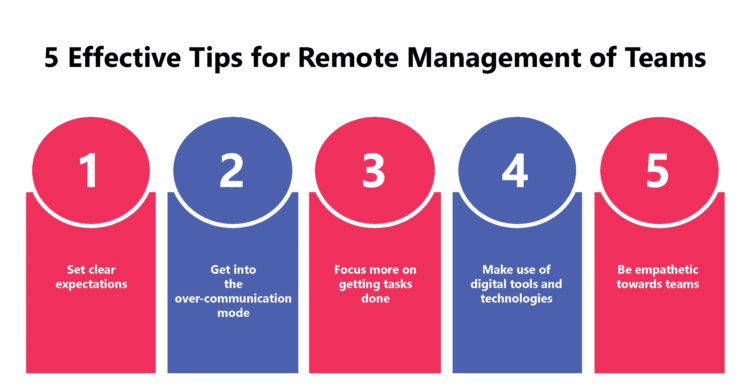Due to the COVID-19 Pandemic, how organizations work has undergone a radical change across the globe. It has forced organizations to enable their employees to work remotely. However, most line managers and supervisors have little or no experience in remote management of teams.

The biggest challenge that managers are facing in remotely managing their teams is them being thrust into this situation without any warning.
In most cases, the pandemic forced organizations to implement remote working without preparation.
In addition, the lack of prior experience among managers responsible for handling remote teams poses a significant challenge.

They were unfamiliar with the tools and technologies for remote team management.
Finally, giving employees the assurance and comfort of coordination between colleagues and work management is challenging.

Given current levels of stress and uncertainty, it is unsurprising that the role of managers has become complicated and critical.
Now, they need to provide additional support and guidance to their teams and ensure that their remote teams are productive.
The following are a few practical strategies that can prove helpful for managers to overcome these challenges:
1. Set clear expectations
2. Get into the over-communication mode
3. Focus more on getting tasks done
4. Make use of digital tools and technologies
5. Be empathetic towards their teams


Managers should make it clear to team members their expectations of them in a remote setup.
They should formulate and communicate precise guidelines such as work timings, deadlines, and accountability of each team member.
Managers must prepare for unforeseen delays and have a proper backup plan to meet deadlines.

Managers must redouble their efforts to communicate effectively and regularly with their team members while managing teams remotely.
Increasing the frequency of communication with the team members helps them stay on top of the various developments.
It also ensures better coordination for the successful completion of tasks.
Moreover, it creates a better bonding between team members so they do not feel isolated even when working remotely.

Changing from working together in one location to working alone can lead to confusion and stress.
Managers should focus more on getting the tasks done on time, rather than micromanaging.
They should also display enough trust and patience with their team members to work flexibly and meet deadlines.
They should especially avoid micro-managing their remote teams, which leads to more stress for team members.

In this age of technology, managing teams remotely is not as difficult as it may seem.
Managers use various digital tools and technologies to create a virtual work environment that mimics their actual workplace.
They can track team members’ performance, monitor their work, and conduct virtual meetings daily.

One of the most significant responsibilities of managers is to be empathetic, especially toward team members working remotely.
Managers should understand that their employees are equally stressed, hence they should give them time to adjust.
They should address their queries and concerns and support them in any other way that keeps them motivated and focused.
Under these challenging conditions, it is critical that frontline managers and team leaders quickly learn the skills of remote management of teams and maximize their productivity.

Lead author: Sagar Chaudhuri, the Co-Founder and CEO of HiFives. He is an HR Tech Evangelist with over 25 years of corporate and entrepreneurship experience. In the past, Sagar has worked in leadership roles with companies such as Genpact, Infosys, and ICICI Bank. He has an engineering degree from IIT Kharagpur and an MBA from IIM Lucknow. Connect on LinkedIn
To stay updated on the latest HiFives blogs, follow us on Twitter (@MyHiFives)